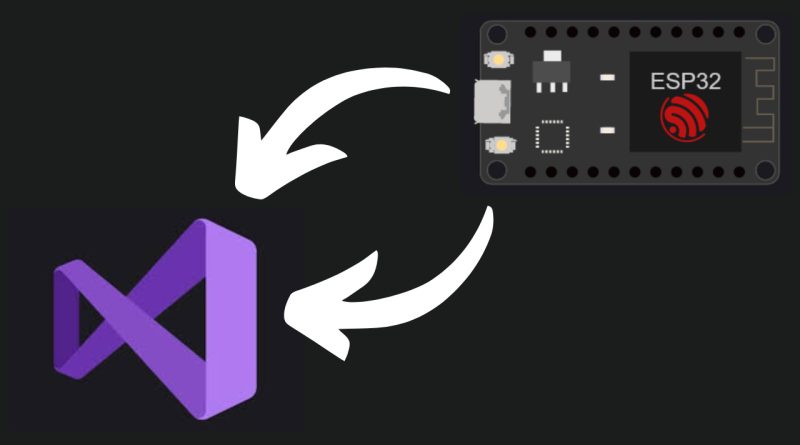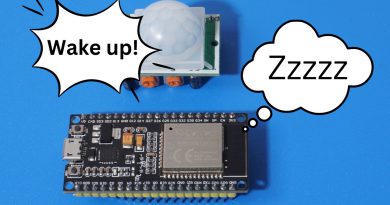How to Receive MQTT Messages From ESP32 Sensors in C# .NET Core
In this video tutorial I demonstrate how to send MQTT messages from an ESP32 microcontroller and receive them in a C# .NET Core application. In this example I’ve used a PIR motion sensor, but it will work with any other type of sensor. MQTT works over wifi so it’s useful if you want to connect your ESP32 to a PC without using a physical cable.
The source code is below.
On the Arduino IDE side the ESP32 requires the standard Wifi libraries and the PubSubClient MQTT library. The C# application uses the MQTTnet Nuget packages.
The ESP32 code in this tutorial could easily be modified for the ESP8266. The ESP8266 is a really good choice for MQTT as code exists to turn it into the MQTT server.
A useful ESP32 pinout reference guide is here. If you want an ESP32 to wake up after being activated by a sensor then you need to connect it to a pin that supports RTC.
Related Videos
Basic introduction to client/server programming using MQTT: https://youtu.be/Igxi6wBQmIM
How to use and test PIR sensors with IoT devices: https://youtu.be/iWpooe98Itk
Sleep ESP32 and wake up again using PIR sensor: https://youtu.be/OcE85Hy8te8
Source Code – Arduino IDE for ESP32
//ESP32 wake up device using PIR sensor and send message to MQTT server #include <WiFi.h> #include <WiFiMulti.h> WiFiMulti WiFiMulti; #include <PubSubClient.h> const char* ssid = "YOUR_WIFI_SSID"; const char* password = "YOUR_WIFI_PASSWORD"; const char* mqtt_server = "192.168.0.9"; //Change this to the IP address of your PC on your internal network (IPConfig will tell you this) #define MOTION_SENSOR 32 //Must be a RTC GPIO WiFiClient espClient; PubSubClient client(espClient); unsigned long lastMsg = 0; #define MSG_BUFFER_SIZE (50) char msg[MSG_BUFFER_SIZE]; int value = 0; RTC_DATA_ATTR int wakeupCounter = 0; //Counter used to configure the device the first time it is switched on void setup_wifi() { delay(10); // We start by connecting to a WiFi network Serial.println(); Serial.print("Connecting to "); Serial.println(ssid); WiFi.mode(WIFI_STA); WiFi.begin(ssid, password); while (WiFi.status() != WL_CONNECTED) { delay(500); Serial.print("."); } randomSeed(micros()); Serial.println(""); Serial.println("WiFi connected"); Serial.println("IP address: "); Serial.println(WiFi.localIP()); } void callback(char* topic, byte* payload, unsigned int length) { Serial.print("Message arrived ["); Serial.print(topic); Serial.print("] "); for (int i = 0; i < length; i++) { Serial.print((char)payload[i]); } Serial.println(); } void reconnect() { // Loop until we're reconnected while (!client.connected()) { Serial.print("Attempting MQTT connection..."); // Create a random client ID String clientId = "ESP8266Client-"; clientId += String(random(0xffff), HEX); // Attempt to connect if (client.connect(clientId.c_str())) { Serial.println("connected"); } else { Serial.print("failed, rc="); Serial.print(client.state()); Serial.println(" try again in 5 seconds"); // Wait 5 seconds before retrying delay(5000); } } } void setup() { pinMode(MOTION_SENSOR, INPUT); ++wakeupCounter; //Increment wakeupCounter Serial.begin(115200); setup_wifi(); client.setServer(mqtt_server, 1883); client.setCallback(callback); Serial.print("Wakeup counter = "); Serial.println(wakeupCounter); if (wakeupCounter > 1) { Serial.println("ESP32 has been woken up!"); triggerAlert(); } else { sleepDevice(); } } void loop(){} void triggerAlert() { Serial.println("Sending alert via MQTT..."); if (!client.connected()) { reconnect(); } //client.loop(); unsigned long now = millis(); if (now - lastMsg > 2000) { lastMsg = now; ++value; snprintf (msg, MSG_BUFFER_SIZE, "Sensor 1 Activated:#%ld", wakeupCounter); Serial.print("Publish message: "); Serial.println(msg); client.publish("securitySensors", msg); } Serial.println("Going back to sleep..."); sleepDevice(); } void sleepDevice() { Serial.println("ESP32 is now sleeping!"); esp_sleep_enable_ext0_wakeup(GPIO_NUM_32, HIGH); esp_deep_sleep_start(); }
Source Code – C# for Visual Studio
Make a new C# .NET Core console app and add the following files:
In Program.cs, comment out anything already there and add the following. You might need to change the namespace to your existing namespace.
using MQTTnet.Samples.Server; await Server_ASP_NET_Samples.Start_Server_With_WebSockets_Support();
Make a new class file called MQTTService.cs and add the following.
// Licensed to the .NET Foundation under one or more agreements. // The .NET Foundation licenses this file to you under the MIT license. // See the LICENSE file in the project root for more information. // ReSharper disable UnusedType.Global // ReSharper disable UnusedMember.Global // ReSharper disable InconsistentNaming // ReSharper disable EmptyConstructor // ReSharper disable MemberCanBeMadeStatic.Local using Microsoft.AspNetCore.Builder; using Microsoft.AspNetCore.Hosting; using Microsoft.Extensions.DependencyInjection; using Microsoft.Extensions.Hosting; using MQTTnet.AspNetCore; using MQTTnet.Server; using MQTTnet.Extensions.ManagedClient; using My_MQTT_Server; namespace MQTTnet.Samples.Server; public static class Server_ASP_NET_Samples { public static Task Start_Server_With_WebSockets_Support() { /* * This sample starts a minimal ASP.NET Webserver including a hosted MQTT server. */ var host = Host.CreateDefaultBuilder(Array.Empty<string>()) .ConfigureWebHostDefaults( webBuilder => { webBuilder.UseKestrel( o => { // This will allow MQTT connections based on TCP port 1883. o.ListenAnyIP(1883, l => l.UseMqtt()); // This will allow MQTT connections based on HTTP WebSockets with URI "localhost:5000/mqtt" // See code below for URI configuration. o.ListenAnyIP(5000); // Default HTTP pipeline }); webBuilder.UseStartup<Startup>(); }); return host.RunConsoleAsync(); } sealed class MqttController { public MqttController() { // Inject other services via constructor. } /// <summary> /// This event is triggered when the client publishes a message to the server /// </summary> /// <param name="eventArgs"></param> /// <returns></returns> public async Task<Task> OnClientPublishAsync(InterceptingPublishEventArgs eventArgs) { string topic = eventArgs.ApplicationMessage.Topic; string message = eventArgs.ApplicationMessage.ConvertPayloadToString(); //Console.Write("Client payload:" + message); bool result = await MessageProcessor.ProcessMessage(topic, message); return Task.CompletedTask; } /// <summary> /// This event is called before OnClientPublishAsync and could be a good place to do security checks etc. /// </summary> /// <param name="eventArgs"></param> /// <returns></returns> public Task ValidateConnection(ValidatingConnectionEventArgs eventArgs) { Console.WriteLine($"Client '{eventArgs.ClientId}' wants to connect. Accepting!"); return Task.CompletedTask; } } sealed class Startup { public void Configure(IApplicationBuilder app, IWebHostEnvironment environment, MqttController mqttController) { app.UseRouting(); app.UseEndpoints( endpoints => { endpoints.MapConnectionHandler<MqttConnectionHandler>( "/mqtt", httpConnectionDispatcherOptions => httpConnectionDispatcherOptions.WebSockets.SubProtocolSelector = protocolList => protocolList.FirstOrDefault() ?? string.Empty); }); app.UseMqttServer( server => { /* * Attach event handlers etc. if required. */ server.ValidatingConnectionAsync += mqttController.ValidateConnection; server.InterceptingPublishAsync += mqttController.OnClientPublishAsync; //The following events might also be useful... //server.ClientConnectedAsync += mqttController.OnClientConnected; //server.InterceptingClientEnqueueAsync += mqttController.OnClientSendMessage; //server.ClientSubscribedTopicAsync += mqttController.OnClientSubscribedTopic; }); } public void ConfigureServices(IServiceCollection services) { services.AddHostedMqttServer( optionsBuilder => { optionsBuilder.WithDefaultEndpoint(); }); services.AddMqttConnectionHandler(); services.AddConnections(); services.AddSingleton<MqttController>(); } } }
Make a new class file called MessageProcessor.cs and add the following:
using System; namespace My_MQTT_Server { public static class MessageProcessor { /// <summary> /// Process the MQTT message. Any long running processes called should be awaitable /// </summary> /// <param name="topic"></param> /// <param name="message"></param> /// <returns></returns> public static async Task<bool> ProcessMessage(string topic, string message) { if (topic == "securitySensors") { Console.WriteLine($"ProcessMessage received message with topic: '{topic}' and message: '{message}'."); return true; } else { Console.WriteLine($"ProcessMessage received message with topic: '{topic}' but is unable to handle this topic."); return false; } } } }



